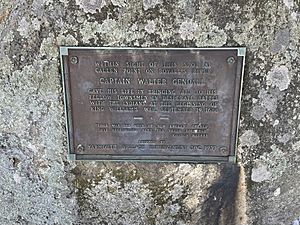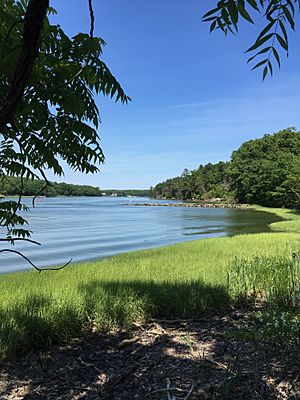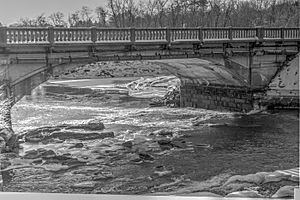Walter Gendall facts for kids
Quick facts for kids
Walter Gendall
|
|
|---|---|

Gendall's memorial plaque in Yarmouth, Maine
|
|
| Born |
Cornwall, England
|
| Died | September 19, 1688 |
| Nationality | English |
| Occupation | Mill owner |
| Known for | Captain in King Philip's War and King William's War |
Walter Gendall was an important English settler who lived in the 1600s. He owned a sawmill in a place called North Yarmouth, which is now Yarmouth, Maine. Walter Gendall was also a brave captain in two big conflicts: King Philip's War and King William's War. He sadly died during King William's War in 1688.
Contents
Walter Gendall's Early Life
Walter Gendall was born in Cornwall, England. He traveled across the ocean and arrived in America around 1640. Records show he lived near Richmond Island, which is off the coast of Cape Elizabeth in what is now Maine. For about twenty years after that, not much is known about Gendall's life.
Gendall's Work and Military Role
During King Philip's War, Captain Gendall was at Fort Lyall in Falmouth in August 1676. He saw that the Native American tribes were very upset. He sent a message to Boston asking for more soldiers, and 130 were sent to help him.
Later, Gendall was captured by Native Americans. He had been friendly with them for many years, visiting their villages and trading animal skins. They held him for a ransom. A writer named Charles Banks said that Gendall "was much esteemed by all the tribes."
In September 1677, a court in Boston found Gendall guilty of acting against the colony because of his good relationship with the Native Americans. Gendall escaped a few days later and is believed to have gone to Scarborough, which is now in Maine. His friend, Nathaniel Fryer, paid a bond to the court, and the issue was resolved.
Peace was made with the Native Americans on August 12, 1678. Three English representatives met with Chief Squando and two other leaders to sign a peace treaty.

On July 12, 1681, Gendall started the Casco Mill in Yarmouth. It was built on the eastern side of the First Falls, where another mill used to be. Gendall lived next to his mill. He also built a simple boarding house on the other side of the river for his mill workers. A few years later, he claimed a large area of land (2,000 acres) that belonged to an early English settler named George Felt. Gendall had bought 100 acres from Felt earlier.
Gendall was chosen to be part of a committee that planned the town of North Yarmouth. The town was officially formed on September 22, 1680. The committee also included Bartholomew Gedney, Joshua Scotton, and Silvanus Davis. The town was planned in an area known as Maine's Point. Later, Gendall and three others became trustees of the town, overseeing its development.
Gendall's Family Life
Walter Gendall was married to a woman named Joane, and they had a family. He lived with them while he was a military officer in Scarborough (around 1661) and Falmouth, which is now Portland, Maine. His father-in-law, John Guy, was a fisherman in Falmouth.
His farm included an area called Duck Cove, which is at the western end of Broad Cove in today's Cumberland Foreside. In 1687, Gendall was given land on Clapboard Island, near what is now Falmouth Foreside.
How Walter Gendall Died
Walter Gendall, who was known as "one of the bravest and foremost men of the early days," died on September 19, 1688. This was soon after the start of Second Indian War. He was shot by Native Americans near Callen Point.
Gendall was taking supplies to his soldiers who were building a fort on the south side of the Royal River. He thought the gunfire had stopped because the Native Americans were out of ammunition, so he decided to cross the river. He made it across safely, but was shot when he reached the other side. His last words were: "I have lost my life in your service." After his death, the Native Americans burned three of Gendall's houses and two of his barns.
A stone marker honoring Gendall stands in Yarmouth, north of 28 Lafayette Street. It was put there by Yarmouth’s Village Improvement Society.
 | Delilah Pierce |
 | Gordon Parks |
 | Augusta Savage |
 | Charles Ethan Porter |


